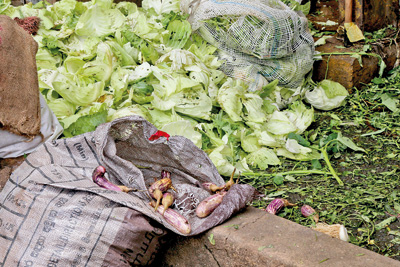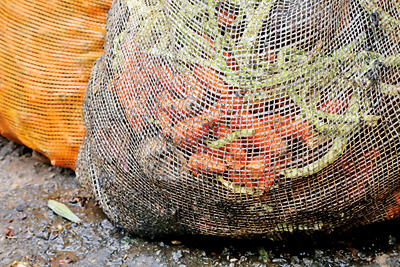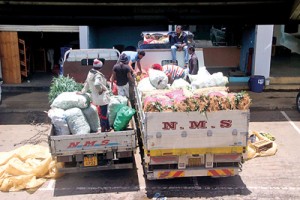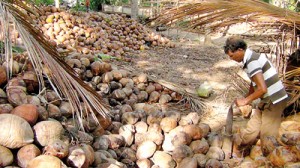News
Something is rotten in the state of our veg market
Piles of rotting vegetables overflowing from garbage bins have become a common sight at the Pettah market, in Colombo, considered one of the main distribution points.

Discarded: Rotting vegetables at the Pettah market. Pix by Ishanka Sunimal
Vegetable sellers complain that they are unable to sell the vegetables at a good price due to surplus of supply and a drop in the quality due to the rains.
Piles of rotting potatoes, cabbage, carrots and leeks with swarms of flies hovering over them can be seen here and there.
A vegetable seller at the Pettah market Nimal Hemachandra (62) said he was forced to sell 500 grams of carrots at Rs 20 due to poor quality and over supply.
“I have to give Rs 500 to the touts to get a slot at the market, as my sales have dropped these days. I had to pay them from the money I bring for the day’s expenditure,” he said.
Another vender Kapila Sanjeewa from Wellampitiya said huge quantities of vegetables are been thrown away when they find it difficult to sell them within two days.
“The vegetables stay fresh only two days, since they are soggy from the rains and they perish faster,” he said.
Sanjeewa said his day starts around 7 a.m, He buys cabbage and radish but he is able to sell only half of the amount as he has to get rid of most of what he buys from the lorries that come to Pettah market from Welimada.
“Today I bought cabbage at the wholesale price of Rs. 30 a kilo from the lorry and I’m selling them at the retail price of Rs 80 . I was forced to throw away most of them though.
Sanjeewa charged that past and present governments promised to provide cold storage room facilities but nothing has materialised.
M. Nimal (50) a vendor from Kaleniya said his business is bad these days as the vegetables are rotting fast because of the rains.
“These days I buy a much smaller quantity of vegetables as I find it difficult to sell them in one day. I am forced to sell the carrot that I usually sell at Rs. 40 per kg at Rs 20 by evening, as I am unable to keep them fresh,” he said.
Vegetable seller M.J Premasiri (54) a resident from Dam Street Colombo said although the rains have forced them to sell the produce at a lower price the consumers have not increased the amount of vegetables they buy.
Meanwhile vegetables farmers and farmer associations hit out at the Government. They charged that in spite of discussions to regarding various polices nothing has been implemented.
All Island Farmers’ Federation’s (AIFF) national organiser Namal Karunaratne said the surplus harvest was a result of farmers prematurely harvesting their vegetables because of the prevailing rainy weather.
He said the rains cause fungus and the vegetables rot faster. To avoid this the farmers who grow the same crop at the same time, harvest it all in one go and bring it to the market, creating a surplus and therefore a reduction in prices.
Mr. Karunatne charged that although they have held discussions with the Agriculture Ministry about policies to mitigate the issue little has been put into action.
“We discussed about having cold storage rooms at the main markets as well as implementing a cultivation policy to control farmers growing the same crop at the same time” he said.
However, the Hector Kobbekaduwa Agrarian Research and Training Institute’s Senior Research Officer Dr. E.A.C Priyankara said that usually, there is a price drop in July every year, but the current vegetable price drop which started a month ago was due to vegetable produce from the previously cultivated Yala season still coming into the market.

Nimal Hemachandra
“The sharp drop of agricultural produce including vegetables in the peak harvesting season is a common problem not only in Sri Lanka but also many developing countries due to the nature of inelastic supply,” he explained.
“We need to take out the excess stock from the market to prevent an sharp drop in prices,” he said.
He explained that although they have come up with solutions for the surplus of harvest, more measures have to be taken to implement them.
Dr. Priyankara explained it was important to implement that would encourage farmers to move away from low- productive crops to high- productive crops.
“We need to encourage investment in the agro processing industry. Processing vegetables is another important solution but it is still not popular with the local market.
He said Sri Lanka should look to exporting excess vegetables abroad. However that too has its challenges as vegetables cannot be preserved for long periods and one has to meet the requirement of high international standards when competing with other countries.
It also important to build cold storage rooms and use air conditioned vehicles to transport and store the excess harvest. He explained that if the harvest was stored in these rooms the same temperature could be maintained until it reached the final consume.
Motivating consumers to increase vegetable consumption is also important to absorb the excess during the peak harvesting season. This would also help to increase the nutrition requirements of the consumers, Dr. Priyankara added.
He also said that they were instructing farmers to engage in cultivating different crops according to the season. But he added that they were unable to control seeds and crop management as they feared they would be held responsible for crop damage or food shortages.
| N’Eliya farmers lament lack of marketing mechanism | |
| Text and Pix by Shelton Hettiarachchi in Nuwara Eliya Vegetable growers in the Nuwara Eliya district are finding it difficult to sell their products. Competition from companies engaged in agricultural production, a lack of a marketing system in the country, escalating costs of seeds, agro-chemicals and labour costs, they say, have left them in dire straits. Added to these difficulties is the fact that ‘upcountry vegetables’ are cultivated not only in Nuwara Eliya but in Jaffna, Anuradhapura, Puttalam, Kalpitiya as well as in Badulla, Welimada, Kandy and Hanguranketha. Kumara Senanayake from Kandapola said there was a need for farmers to organise themselves at a national level and draw up plans to face problems as one body. Presently he said, farmers only came together when prices dropped. There is a need to be constantly vigilant, he said. W.M. Karunasena from Galpalama grows cabbages. He spoke of a recent experience he faced to explain the difficulties farmers faced. “An employee of a businessman came to my land and cut some cabbage. Neither the businessman nor his assistant came to pick up the cabbage even by evening. I later learnt that the price of cabbage had dropped. I had to take all those cabbages and put them in my shop. I don’t know what to do,” he lamented. |
| Producers go nuts over plummeting coconut prices | |
| Text & Pix by Hiran Priyankara Jayasinghe A bumper coconut harvest in the coconut triangle, has created a surplus in the market, slashing the unit price down to Rs. 20 in the coconut belt. The price drop has affected the landowners, who are hard put to cover production costs. Planter R.M. Karunaratne commenting says a labourer is paid around 1,500 per day. “Maintaining coconut plantations is a labour-intensive task involving fertilising, weeding and digging drainage systems around trees etc. We invest millions in the industry and have to wait months for the returns. The drought was followed by the monsoon, and we had to incur unexpected expenses to adjust,” he said. Coconut Development Authority Chairman Udaya Rupasinghe said the rainy weather has ensured a surplus in the supply chain through bountiful production in this commercial agriculture crop. “There are eight coconut milk powder plants operating, catering to the increased demand in instant coconut milk. To strike a balance between supply, demand and price, we have to take protective measures and regulate the market, ” Mr Rupasinghe said. |



